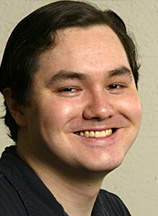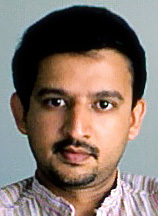


|
Ivan Askwith
|
|
Ivan Askwith is Head of Digital Media with Lucasfilm whose areas of interest includes engagement, transmedia stories, serial narrative and user experience. Building upon his prior work as a media analyst in MIT's Convergence Culture Consortium, Ivan's work has focused on generating deep cross-platform audience engagement and helping brands and entertainment properties build and maintain meaningful and relevant relationships with audiences.
Previously, he was Director of Strategy at Big Spaceship, an award-winning creative agency based in Brooklyn, NY. As head of the strategic practice, Ivan led an interdisciplinary team responsible for audience insights, user experience and content strategy, social and propagation planning and behavior analysis, and helped clients navigate the digital landscape and understand emerging behaviors. During his time at Big Spaceship, his clients included GE, NBC Universal, Sony Pictures, A&E, HBO, Linden Lab, the Wrigley Company, and more.
Ivan holds a Master's degree from the Program in Comparative Media Studies at MI, where his work focused on modern television's increasing emphasis on transmedia narrative in creating and sustaining audience engagement. In addition, Ivan has published chapters on audience behavior and franchise development in several books and encyclopedias. He is a frequent speaker and lecturer on digital strategy, transmedia engagement and online communities at both academic and business conferences, including Ad:Tech, CAT, Digital Hollywood and the NAB Show. He is also an occasional contributor to magazines like Slate and Salon. For the Convergence Culture Consortium, he authored "This Is Not (Just) An Advertisement: Understanding Alternate Reality Games".
He can be reached at ivan.askwith@gmail.com and found on Twitter @ivanovitch.
|
|
|
Alec Austin
|
|
Alec Austin is a game designer and fiction writer based out of the San Francisco Bay Area. He holds a Master’s degree from the Program in Comparative Media Studies at MIT, where he was a researcher with the Convergence Culture Consortium and authored the white papers “Selling Creatively”, “How to Turn Pirates into Loyalists”, and “Playing in Other Worlds”. He is a Futures of Entertainment Fellow.
Alec’s game credits include Command & Conquer 4, the Pokemon TCG Online, the Kaijudo Battle Game, and Kaijudo Online, and he’s worked on a wide range of free-to-play projects throughout his career. His work on the implicit contract between media producers and audiences is referenced in Spreadable Media, his stories have appeared in a variety of online venues, and he handles programming for the Fourth Street Fantasy Convention in Minneapolis. He can be found on Twitter as @AlecChaneAustin.
|
|
|
Laurie Baird
|
|
Laurie Dean Baird is an innovative thought leader in the media and entertainment industry focusing on emerging technology, social practices and business models in the changing media landscape. She has over 20 years of experience in corporate strategy, business development and R&D in digital media and frequently speaks on the changing industry. She has provided technology insights to ESPN, Public Media International and the Time Warner family, including Turner Broadcasting, HBO, Warner Brothers, Time Inc, AOL and Time Warner Cable. She is a research fellow at the Futures of Entertainment and a strategic consultant at the Georgia Tech - Institute for People and Technology. Areas of interest include: media synergies, audience engagement, digital media, social media, transmedia, two screen and companion applications, interactive viewing, personalization, data analytics, cloud services and future of storytelling. Baird advises several domestic and international organizations. She is a board member of the MIT College of Humanities, Arts and Social Sciences and the Georgia Tech GVU Center. She was named one of the Most Powerful Women in Cable Technology by WICT and CableFax Magazine and named a finalist for Women in Technology – Woman of the Year. Baird earned a BS in physics and BA is sociology from St. Lawrence University, and a SM (MBA) from the MIT Sloan School of Management. She can be followed on Twitter @LawD.
|
|
|
Sarah Banet-Weiser
|
|
Sarah Banet-Weiser is an Associate Professor in the School of Communication at the Annenberg School for Communication & Journalism and the Department of American Studies and Ethnicity at the University of Southern California. Her teaching and research interests include feminist theory, race and the media, youth culture, popular and consumer culture, and citizenship and national identity. She teaches courses in culture and communication, gender and media, youth culture, feminist theory and cultural studies.
Sarah's co-edited collection, Commodity Activism: Cultural Resistance in Neoliberal Times, co-edited with Roopali Muhkerjee, is coming out in 2012 from New York University Press. Her current book project with NYU Press, Authentic TM: Political Possibility in a Brand Culture, examines brand culture, youth, and political possibility through an investigation of self-branding, creativity, politics, and religion.
Her 1999 book, The Most Beautiful Girl in the World: Beauty Pageants and National Identity, explores a popular cultural ritual, the beauty pageant, as a space in which national identities, desires, and anxieties about race and gender are played out. She also authored a 2007 book on consumer citizenship and the children's cable network: Kids Rule! Nickelodeon and Consumer Citizenship and co-edited the 2007 book Cable Visions: Television Beyond Broadcasting with Cynthia Chris and Anthony Freitas.
She has published articles in the academic journals Critical Studies and Media Communication, Feminist Theory, the International Journal of Communication, and Television and New Media, among others. Sarah co-edits, with Kent Ono, a book series with New York University Press, entitled "Critical Cultural Communication", and is the editor of American Quarterly.
|
|
|
Nancy Baym
|
|
Nancy Baym is Professor of Communication Studies at the University of Kansas, where she teaches about communication technology, interpersonal communication and qualitative research methods.
She pioneered the study of online community and fandom in the early 1990s, writing about how soap opera fans built relationships with one another while transforming television viewing into a collaborative endeavor. Her book Tune In, Log On: Soaps, Fandom and Online Community synthesizes that work.
Nancy is author of the 2010 book Personal Connections in the Digital Age, which focuses on digitally mediated community, relationships and social networks. She is also co-editor of the 2008 book Internet Inquiry: Conversation about Method with Annette Markham. Their book focuses on examining how exemplary qualitative researchers manage the challenges raised when studying the internet. She has published "The New Shape of Online Community: The Case of Swedish Independent Music Fandom" in First Monday, as well as articles in New Media & Society, The Handbook of New Media, and The Information Society. In addition, she authored "Embracing the Flow" for the Convergence Culture Consortium.
Nancy was a co-founder of the Association of Internet Researchers and served as its President. She was one of several editors of The Internet Research Annual, Vol. 1, a 2004 collection of papers from AoIR conferences. She blogs at OnlineFandom and Beautiful and Strange. She can be reached at nbaym@ku.edu and found on Twitter @nancybaym.
|
|
|
Bud Caddell
|
|
Bud Caddell is a speaker, blogger, consultant, and current Invention Strategist in-residence at Deutsch LA. He is currently working on his first book: a treatise on embracing complexity and systems thinking in a more interconnected and interrelated world. Bud is also assembling a network of creative professionals, The Bucket Brigade, dedicated to solving complex problems using systems thinking and collaboration.
Bud has worked with a variety of groundbreaking digital agencies/consultancies, including Undercurrent and Victors & Spoils. His work has been featured in The New York Times, The Wall Street Journal, Forbes, and Advertising Age. Personally, he's been cited in NYMag and Harvard Business Review. His essay, "Becoming a Mad Man," on emerging media fandom has earned him citations in Grant McCracken's Chief Culture Officer and the forthcoming NYU Press book Spreadable Media from Henry Jenkins, Sam Ford, and Joshua Green.
Bud blogs at What Consumes Me. He can be reached at reachme@budcaddell.com and found on Twitter @bud_caddell.
|
|
|
Todd Cunningham
|
|
Todd Cunningham is Senior Vice-President of Strategic Insights and Research at MTV Networks. Todd, who has been highlighted as one of Brandweek's "Marketers of the Year," leads the MTVN Strategic Insights and Research Group, which is focused on the avid pursuit of unique approaches to uncovering and translating emotional connections into real business-building opportunities across the brands and content experiences of MTV Networks on-air, online, on mobile devices, on-demand, on social media and still growing.
In his role, Todd has oversight for consumer-led facets of MTVN's advertiser and external marketing partnerships and many of the company's emerging businesses. His most recent accomplishments include leading the company's efforts in defining engagement as a metric and establishing frameworks of social media monitoring measurement as well as breaking new ground with market-leading, insight-rich accountability planning and measurement tools. He can be reached at Todd.Cunningham@mtvstaff.com.
|
|
|
Abigail De Kosnik
|
|
Abigail De Kosnik is an Assistant Professor at the University of California, Berkeley in the Berkeley Center for New Media (BCNM) and the Department of Theater, Dance & Performance Studies. She researches intersections of minority discourse with artistic appropriations, especially digital appropriations such as sampling, online fan productions, game mods, and audio and visual mash-ups; Internet piracy and "torrent culture"; narrative serializations in digital contexts; and "techno-orientalism," or Hollywood sci-fi's equation of futuristic technologies with Asia and Asianness.
Gail is the co-editor, with Sam Ford and C. Lee Harrington, of the 2011 book The Survival of Soap Opera: Transformations for a New Media Era. Her book Illegitimate Media: Minority Discourse and Digital Remix Culture, is forthcoming from the University of Georgia Press. For the Convergence Culture Consortium, she authored "Piracy Is the Future of Television".
She can be reached at adekosnik@berkeley.edu and found on Twitter @De_Kosnik.
|
|
|
Ana Domb Krauskopf
|
|
Ana Domb Krauskopf is currently creating an Interaction Design School at Veritas University in Costa Rica. Until recently she was the Director of Brand Innovation at Almabrands in Chile. She is a journalist, film and music producer and ethnographer and teaches courses on applied communications with Universidad del Desarrollo. Prior to moving to Chile, she worked in user experience research at THE MEME, a design consultancy firm based out of Cambridge.
Ana holds a Master's degree from the Program in Comparative Media Studies at MIT, where she was a researcher with the Convergence Culture Consortium. In her native Costa Rica, she co-founded Cinergia, the first film production fund designed to stimulate media activity in Central America and Cuba. There, she also worked with the Papaya Music label, where she co-produced the Papaya Fest, an eclectic large-scale Central American music festival.
Over the past few years, Ana's work has focused on alternative distribution and audience engagement. She co-authored "If It Doesn't Spread, It's Dead: Creating Value in a Spreadable Marketplace" with Henry Jenkins and Xiaochang Li, the white paper which inspired the forthcoming NYU Press book Spreadable Media: Creating Value and Meaning in a Networked Society by Jenkins, Sam Ford, and Joshua Green. She also wrote the white paper "Tacky and Proud: Exploring Technobrega's Value Network" for the Consortium.
Ana has also consulted with Turner Broadcasting and Comcast, as well as working beside anthropologist and FoE Fellow Grant McCracken. She can be reached at anadomb@gmail.com and found on Twitter @anadk.
|
|
|
David Edery
|
|
David Edery is Principal of Fuzbi, an independent consulting firm focused on the business and design of digitally-distributed and online games He is also CEO of Spry Fox, a game development studio focused on making the world a happier place. In addition, he is a director on the board of the International Game Developers Association (IGDA) and a research affiliate of the MIT Comparative Media Studies Program (MIT CMS). Previously, David was the Worldwide Games Portfolio Manager for Microsoft's Xbox Live Arcade service and the MIT CMS Program's Associate Director for Special Projects before Microsoft.
David is the co-author of the 2008 book Changing the Game: How Video Games are Transforming the Future of Business with Ethan Mollick. The book is a review of the ways that games are helping companies to connect with customers, to attract, train, and motivate employees, and to boost their productivity. (Notable press reviews can be found here.) He has also written for The New York Times' Freakonomics blog and authored "Reverse Product Placement in Virtual Worlds" for Harvard Business Review.
David received his MBA from the MIT Sloan School of Management, where he concentrated on marketing and entrepreneurship, and his BA in English Literature from Brandeis University. He can be reached here.
|
|
|
Sam Ford
|
|
Sam Ford is Director of Audience Engagement with Peppercomm Strategic Communications and an affiliate with both the Program in Comparative Media Studies at MIT and the Popular Culture Studies Program at Western Kentucky University.
He is co-author of the 2013 Spreadable Media: Creating Value and Meaning in a Networked Culture with Henry Jenkins and Joshua Green with New York University Press. He is also co-editor of the 2011 book The Survival of Soap Opera: Transformations for a New Media Era with Abigail De Kosnik and C. Lee Harrington.
Sam has written for BusinessWeek, The Huffington Post, Portfolio, Chief Marketer, The Public Relations Strategist, PR News, Bulldog Reporter, The Christian Science Monitor, and a range of other publications and blogs. His has also been quoted or had his work featured in Investor's Business Daily, New York TImes Magazine, The Financial Times, CNN, NPR, BBC Worldwide, The Australian Broadcasting Corporation, Télérama,The Boston Globe, Boing Boing, Slashdot, Mashable, ESPN: The Magazine, Reader's Digest, Soap Opera Weekly, PRWeek, The Firm Voice, and other publications. He has spoken at South by Southwest Interactive, The Word of Mouth Marketing Association's School of WOM, the Futures of Entertainment conference and the annual conferences of The Society of Cinema and Media Studies and the Popular Culture Association, among others. He is also on the editorial board of Transformative Works and Cultures.
For the Convergence Culture Consortium, Sam authored "Fandemonium: A Tag Team Approach to Enabling and Mobilizing Fans", "No Room for Pack Rats: Media Consumption and the College Dorm", and "Fanning the Audience's Flames: Ten Ways to Embrace and Cultivate Fan Communities".
Sam holds a Master's degree from the Program in Comparative Media Studies at MIT and a Bachelor's degree from Western Kentucky University, where he majored in news/editorial journalism, mass communication, communication studies, and English. He is a Kentucky Press Association award-winning journalist and has performed in a variety of local professional wrestling events. He lives in Bowling Green, Kentucky, with wife Amanda and daughter Emma. He writes regularly for Fast Company. Sam can be reached at samford@mit.edu and found on Twitter @Sam_Ford.
|
|
|
Jonathan Gray
|
|
Jonathan Gray is an Associate Professor of Media and Cultural Studies at University of Wisconsin, Madison. Jonathan's research examines the interactions of entertainment media and audiences, with particular interest in parody and satire, transmedia storyworlds, international media flows, and the changing nature of "television." He is currently working on a project on media circulation and mobility in Malawi and is also pottering away on two other projects: one on the meanings of "anti-fandom," examining dislike of certain media; the other on videogames' place in film or television franchises.
Most recently, Jonathan co-authored the 2011 book Television Studies with Amanda D. Lotz. He also wrote the 2010 book Show Sold Separately: Promos, Spoilers, and Other Media Paratexts about all those things that surround film and television, from games to trailers, spinoffs to spoilers, toys to hype, reviews to fan creations. His previous books include the 2008 Television Entertainment and the 2006 Watching with The Simpsons: Television, Parody, and Intertextuality.
Jonathan is co-editor of the forthcoming A Companion to Media Authorship from Wiley-Blackwell Press with Derek Johnson, as well as a 2009 collection entitled Satire TV: Comedy and Politics in a Post-Network Era with Jeffrey P. Jones and Ethan Thompson. He co-edited the 2008 encyclopedia of media hot-button issues Battleground: The Media with Robin Andersen and of the 2007 book Fandom: Identities and Communities in a Mediated World with Cornel Sandvoss and C. Lee Harrington.
Jonathan has a Master's degree and Ph.D. in Media and Communication Studies from Goldsmiths College, University of London. He also has a Master's degree in Literature from Commonwealth Countries from the University of Leeds and a Bachelor's degree in English from the University of British Columbia. He writes at The Extratextuals and Antenna. He can be reached at jagray3@wisc.edu and found on Twitter @jonathanagray.
|
|
|
Joshua Green
|
|
Joshua Green works at Undercurrent, a digital strategy firm in New York City, where he is a Research Specialist. He is co-author (with Henry Jenkins and Sam Ford) of Spreadable Media: Creating Value and Meaning in a Networked Culture, forthcoming from New York University Press and (with Jean Burgess) of the 2009 book YouTube: Online Video and Participatory Culture, the first large-scale analysis of YouTube's content, structure, and uses.
Before joining Undercurrent, Joshua served as Project Manager of the Media Industries Project at the Carsey-Wolf Center at the University of California, Santa Barbara. Previous to that, he was a Postdoctoral Researcher in the Program in Comparative Media Studies Program at MIT, where he was also Research Manager of the Convergence Culture Consortium project. He has published work about television, new media, and participatory culture.
For the Convergence Culture Consortium, Joshua co-authored "YouTube: Online Video and Co-Created Value" with Jean Burgess.
Joshua holds a PhD in Media Studies from the Queensland University of Technology in Brisbane, Australia. He can be reached at joshua.green@undercurrent.com and found on Twitter @joshgreen.
|
|
|
C. Lee Harrington
|
|
C. Lee Harrington is Professor of Sociology and Affiliate of the Women, Gender, and Sexuality Studies Program at Miami University and a Futures of Entertainment Fellow. Her areas of research include television studies, fan studies, and the sociology of law.
Lee's long research collaboration with Denise D. Bielby has focused on the daytime soap opera genre, its audiences and fans, and its global circulation. Their joint work includes their 2008 book on global television distribution, Global TV: Exporting Television and Culture in the World Market; the 2001 edited collection Popular Culture: Production and Consumption; and the 1995 book Soap Fans: Pursuing Pleasure and Making Meaning in Everyday Life.
She also co-edited a 2011 book on U.S. daytime serial dramas entitled The Survival of Soap Opera: Transformations for a New Media Era with Abigail De Kosnik and Sam Ford and a 2007 anthology on fandom titled Fandom: Identities and Communities in a Mediated World with Jonathan Gray and Cornel Sandvoss and an upcoming collection on the U.S. soap opera.
Lee has published on issues of sexual representation on television in Feminist Media Studies and Journal of Broadcasting & Electronic Media and issues of aging actors and audiences in Journal of Aging Studies and International Journal of Cultural Studies. For the Convergence Culture Consortium, she wrote "Aging and the Future of Media Fandom".
Current research projects include a study of acting and aging on daytime soaps and a study of media framing of death row volunteers (inmates who want to be executed). She received her Ph.D. in Sociology from the University of California-Santa Barbara. She can be reached at harrincl@muohio.edu.
|
|
|
Ted Hovet
|
|
Ted Hovet is professor of film studies and composition at Western Kentucky University. He has recently published on early film exhibition, pedagogy, and film adaptation. He has published in Pedagogy, 19: Interdisciplinary Studies in the Long Nineteenth Century, Literary London, and The Quarterly Review of Film and Video, as well as the 2010 collection Undergraduate Research in English Studies, edited by Laurie Grobman and Joyce Kinkead.
Ted's current project is entitled "Framing Motion: Containing the Image in Early Cinema and Beyond." He researches the emergence of the screen as the "default" site for image display in the late nineteenth century and the continued dominance of this method of display across various media today. He is also investigating the pedagogical issues involved in the introduction of new technologies into educational settings and the application of concepts of fair use in the classroom.
Ted received his Ph.D. from Duke University. He can be reached at ted.hovet@wku.edu.
|
|
|
Henry Jenkins
|
|
Henry Jenkins is Provost's Professor of Communication, Journalism and Cinematic Arts at the University of Southern California. From 1993-2009, he was the MIT Peter de Florez Professor of Humanities and co-directed MIT's Comparative Media Studies graduate degree program. As one of the first media scholars to chart the changing role of the audience in an environment of increasingly pervasive digital content, Henry is a widely recognized expert on the effects of participatory media on society, politics and culture; the role of journalism in the digital age; transmedia storytelling; and fan culture.
Henry is co-author of the book Spreadable Media: Creating Value and Meaning in a Networked Culture with Sam Ford and Joshua Green, forthcoming from New York University Press. The book is based on a white paper Henry co-wrote with Xiaochang Li and Ana Domb for the Convergence Culture Consortium, entitled "If It Doesn't Spread, It's Dead: Creating Value in a Spreadable Marketplace". He is also author of the 2006 book Convergence Culture: Where Old and New Media Collide.
At USC, Henry has formed the Participatory Culture and Learning Labs, which includes Project New Media Literacies, an initiative he began at MIT, as well as Media Activism and Participatory Politics, a research group seeking to better understand the blurring lines between participatory culture and civic engagement. He is also co-chair, with Denise Mann, of the Transmedia Hollywood conference. At MIT, Henry was principal investigator for a variety of research groups, including the Convergence Culture Consortium, The Education Arcade, the Knight Center for Future Civic Media, and the Singapore-MIT GAMBIT Game Lab.
Additionally, Henry wrote the 2006 book Fans, Bloggers and Gamers: Exploring Participatory Culture; the 2006 book The Wow Climax: Tracing the Emotional Impact of Popular Culture; the 1992 book Textual Poachers: Television Fans and Participatory Culture; and the 1992 book What Made Pistachio Nuts?: Early Sound Comedy and the Vaudeville Aesthetic. With John Tulloch, he co-wrote the 1995 book Science Fiction Audiences: Watching Doctor Who and Star Trek. And, with Ravi Purushotma, Margaret Weigel, Katie Clinton, and Alice J. Robison, Henry is co-author of Confronting the Challenges of Participatory Culture: Media Education for the 21st Century, released as a book in 2009.
As an editor, Henry put together the 1998 book The Children's Culture Reader. He is also co-editor of the 2003 book Democracy and New Media with David Thorburn; the 2003 book Rethinking Media Change: The Aesthetics of Transition with David Thorburn; the 2003 book Hop on Pop: The Politics and Pleasures of Popular Culture with Tara McPherson and Jane Shattuc; and the 2000 book From Barbie to Mortal Kombat: Gender and Computer Games with Justine Cassell; and the 1994 book Classical Hollywood Comedy with Christine Brunovska Karnick.
Henry has a Ph.D. in Communication Arts from the University of Wisconsin, Madison and a Master's degree in Communication Studies from the University of Iowa. He blogs regularly at Confessions of an Aca-Fan. Henry can be reached at hjenkins@usc.edu found on Twitter @henryjenkins.
|
|
|
Derek Johnson
|
|
Derek Johnson is Assistant Professor of Media and Cultural Studies at the University of Wisconsin, Madison. His research explores the collaborative, but uneasy, negotiations required of corporations, contracted creators, and consumers as "franchised" intellectual properties have been shared among multiple sites of cultural production in the television, film, game, and comic industries.
As part of his research Derek has examined the licensing of Marvel Comics characters, the creative reimagining of Battlestar Galactica, the transnational partnerships supporting Transformers, and the grassroots production of video game mods. He has also written extensively on fandom and the role of audiences as creative laborers within the media industries.
Derek's book, Creative License: Media Franchising and the Collaborative Production of Culture, is forthcoming from NYU Press. He is also co-editor of the forthcoming A Companion to Media Authorship from Wiley-Blackwell Press with Jonathan Gray and is currently working on a co-edited collection tentatively titled Intermediaries: Management of Culture and Cultures of Management with Derek Kompare and Avi Santo. For the Convergence Culture Consortium, Derek authored "Learning to Share: The Relational Logistics of Media Franchising".
His work has been published in journals including Popular Communication and The Velvet Light Trap, as well as the anthologies Reading Lost and Convergence Media History. Derek received his Ph.D. from the University of Wisconsin, Madison. He can be reached at drjohnson3@wisc.edu.
|
|
|
Peter Kim
|
|
Peter Kim is the Chief Strategy Officer of The Dachis Group, a social business consultancy. He advises brands on social business strategy through hands-on engagements, workshops, and on-call advisory.
Peter is a leading thinker and analyst on social business who has been quoted in media outlets including CNN, CNBC, NPR, The New York Times, and The Wall Street Journal. He has spoken at a wide range of events, including South by Southwest Interactive, the Web 2.0 Expo, the Futures of Entertainment conference, and Dachis Group Social Business Summits.
Prior to joining The Dachis Group, Peter was an analyst at Forrester Research, focusing on social technology and marketing strategy. Earlier, he managed international marketing operations, e-commerce, and digital marketing for PUMA AG.
Peter holds an MBA from the Darden School at the University of Virginia and a Bachelor's degree from the University of Pennsylvania. He blogs regularly at Being Peter Kim. He can be reached at hello@beingpeterkim.com and found on Twitter @peterkim.
|
|
|
Robert V. Kozinets
|
|
Robert V. Kozinets is Professor of Marketing and Chair of the Marketing Department at York University's Schulich School of Business in Toronto, Ontario, Canada. An anthropologist by training, he previously was a full-time faculty member at Northwestern's Kellogg School of Management in Chicago and the University of Wisconsin-Madison's School of Business.
Rob has extensive speaking and consulting experience with a range of Fortune 500 and mid-size companies, including Campbell Soup, Merck, Coca-Cola, eBay, IBM, TD Bank, and HSBC, among others. He developed and continues to expand the technique of netnography, or Internet ethnography, for the marketing-related study of online communities, blogs, social networking sites, and virtual worlds.
His research on word-of-mouth marketing, brand management, fandom and entertainment, community marketing, prosumer Web 2.0 strategies, technology, and retailing has been published in journals such as the Journal of Marketing, the Journal of Consumer Research, the Journal of Advertising Research, the Journal of Marketing Research, the Journal of Contemporary Ethnography, the Journal of Retailing, as well as more than 70 articles, chapters, and proceedings.
Rob is author of the 2010 book Netnography: Doing Ethnographic Research Online and co-author of the 2007 book Consumer Tribes with Bernard Cova and Avi Shankar. He writes regularly at Brandthroposophy, his blog. He can be found on Twitter @kozinets.
|
|
|
Alex Leavitt
|
|
Alex Leavitt is a doctoral student in Communication at the Annenberg School for Communication & Journalism at the University of Southern California. His primary research focuses on alternative uses of social media, networked communication, and Internet culture. On the side, he studies digital transnational fandom around Japanese pop culture.
Prior to USC, Alex was a research assistant to danah boyd at Microsoft Research New England. He also researched with the Convergence Culture Consortium, where he wrote "Watching with the World: Television Audiences & Online Social Networks". Additionally, Alex has served as a Lead Researcher on the Web Ecology Project and has worked with the Berkman Center for Internet & Society at Harvard University.
Alex has written frequently for the Futures of Entertainment blog, and he writes long-form about his research at The Department of Alchemy blog. He can be reached via email at alexleavitt@gmail.com and on Twitter @alexleavitt.
|
|
|
Lara Lee
|
|
Lara Lee is Chief Innovation Officer at Continuum, a global innovation and design strategy firm headquartered in Boston with offices in Shanghai, Seoul, Milan and Los Angeles. She leads the development of new offerings, areas of practice and alliances, and a collection of interdisciplinary research communities dedicated to identifying emerging themes, interpreting what they mean for business, and translating those insights into provocative points of view as well as tangible advice for clients.
As a business leader with more than 20 years experience delivering organic growth and transformational change for some of the world's leading brands, across cultures and around the globe, Lara in 2006 was named one of 25 "Masters of Innovation" by BusinessWeek. Lara has written for a range of publications, including Harvard Business Review and Forbes . She has also spoken at the Sustainable Brands conference and events for the Marketing Science Institute, the Futures of Entertainment, and the International Designers Society of America. Lara serves on the board of Professional Business Women of California.
Lara was formerly a principal at Jump Associates, where she consulted with clients from Hewlett-Packard and Federal Express to New Leaf Paper and The San Diego Zoo to identify growth opportunities and build new businesses. Previously, Lara spent 14 years at the Harley-Davidson Motor Company, where as VP and Head of the Enthusiast Services division she built an $80 million 100-person experiential services business that attracted underserved audiences to motorcycling, including women, younger adults, and minority groups, while enriching the Harley brand experience for existing customers and generating profitable growth. Her work included the creation of the Harley-Davidson Museum and the Rider's Edge new rider training business, development of the European and Asia-Pacific markets for core motorcycle and accessories product lines, pioneering online direct-to-customer retailing and leadership of all online activities for the Harley-Davidson and Buell brands. Lara's early career included marketing, strategy, finance and operational assignments with multinational firms, primarily in Asia.
Lara holds a Master's degree in International Affairs/East Asia from the University of Pennsylvania, an MBA in Multinational Management from The Wharton School at the University of Pennsylvania, and a Bachelor's degree in Chinese Language from Brown University. She can be reached at llee@continuuminnovation.com.
|
|
|
Xiaochang Li
|
|
Xiaochang Li is a doctoral student in the Department of Media, Culture, and Communications at New York University, where her present interests broadly sit at the confluence of location-based and context-aware technologies, data and metadata, and globalization and cultural geography.
On the academic side, prior to joining NYU, she received her Master's degree from the Program in Comparative Media Studies at MIT, where her research focused on the transnational circulation of East Asian television drama online and its impact on existing models of diaporic audienceship, publics, and cultural negotiation in an increasing global media landscape. She was also part of the core research team of the Convergence Culture Consortium research project. With Henry Jenkins and Ana Domb, she is co-author of "If It Doesn't Spread, It's Dead: Creating Value in a Spreadable Marketplace", the white paper which inspired the forthcoming NYU Press book Spreadable Media: Creating Value and Meaning in a Networked Society by Jenkins, Sam Ford, and Joshua Green. She also wrote the white paper "More than Money Can Buy: Locating Value in Spreadable Media" for the Consortium.
On the industry side, Xiaochang was a Digital Brand Strategist at Weber Shandwick, one of the world's leading PR and communications agencies, where she worked on digital and global communications strategy with clients such as PepsiCo and Samsung. Xiaochang blogs about the intersections of digital media, globalization, and consumer culture at Canary Trap.
She can be reached at xiaochang.li@gmail.com and found on Twitter @xiaochang.
|
|
|
Geoffrey Long
|
|
Geoffrey Long is a media analyst, scholar, and author exploring transmedia experiences and emerging entertainment platforms at Microsoft. He is also co-editor of the Playful Thinking book series from MIT Press.
Geoffrey received his Master's degree from the Program in Comparative Media Studies at MIT, where he served as a media analyst for the Convergence Culture Consortium. Before joining Microsoft, he worked for the the Singapore-MIT GAMBIT Game Lab. He currently serves as an executive board member for the Interstitial Arts Foundation and as an editorial board member for both Eludamos and Transformative Works and Cultures.
Through his work with the Convergence Culture Consortium, Geoffrey authored "How to Ride a Lion: A Call for a Higher Transmedia Criticism" and "Moving Stories: Aesthetics and Production in Mobile Media". He writes on his personal journal site. He can be reached at glong@geoffreylong.com and found on Twitter @geoffreylong.
|
|
|
Amanda D. Lotz
|
|
Amanda D. Lotz is Associate Professor of Communication Studies at the University of Michigan. She is currently working on a new book exploring men and masculinity in contemporary cable television series.
She is co-author of the 2011 book Understanding Media Industries with Timothy Havens and of the 2011 book Television Studies with Jonathan Gray. Amanda is also author of the 2007 book The Television Will Be Revolutionized and the 2006 book Redesigning Women: Television after the Network Era. In addition, she edited the 2009 collection Beyond Prime Time: Television Programming in the Post-Network Era.
Amanda has participated in a variety of media industry programs for academics, such as the NATPE Faculty Fellow and Faculty Development Grant Programs, AEF Visiting Professor Program, and the ATAS Faculty Seminar. She has also been involved in consulting activities with Competing Values and NBCU owned-and-operated stations. She can be reached at lotz@umich.edu.
|
|
|
Ben Malbon
|
|
Ben Malbon is Director of Strategy at Google's Creative Lab, a team of misfits which includes designers, writers, creative technologists, web developers, film editors, producers, and creative directors and whose mission is to remind the world what it is they love about Google.
Prior to joining Google, Ben was the Executive Director of Innovation at Bartle Bogle Hegarty in New York and was responsible for introducing and driving innovation inside BBH in three main areas: new platforms, new partners, and new processes. While at BBH, Ben also co-founded BBH Labs, a more outwardly focused technology-driven innovation group designed to ensure the agency was as smart as possible when it came to change. In reality, what consumed most of Ben's time at BBH was overseeing the various Google projects on which BBH partnered with Google's Creative Lab.
Previously, back in the UK, Ben was Global Planning Director at BBH London, working primarily on British Airways & Google. Prior to that, he served as Strategy Director on Volkswagen at BMP DDB.
Ben holds a Ph.D. in the social psychology of ecstasy, but he doesn't remotely understand the subject. Nevertheless, he is author of the 1999 book Clubbing: Dancing, Ecstasy and Vitality. He blogs at Less, But Better. He can be reached at benmalbon@google.com and found on Twitter @malbonnington.
|
|
|
Denise Mann
|
|
Denise Mann is Associate Professor in the School of Theater, Film and Television at UCLA and head of the UCLA Producers Program. She is co-chair of the annual Transmedia Hollywood conference with Henry Jenkins, a collaborative event between UCLA and the University of Southern California and a sister event to the Futures of Entertainment conference and a Futures of Entertainment Fellow.
Denise is author of the 2008 book Hollywood Independents: The Postwar Talent Takeover. She is also co-editor of the 1992 book Private Screenings: Television and the Female Consumer, with Lynn Spigel. She has published articles on television and consumer culture in a range of journals and was associate editor of Camera Obscura, a journal of feminism and film theory, from 1986 to 1992.
At UCLA, Denise teaches courses on contemporary entertainment industry practices, as well as film and television history and theory. In addition, she is a consultant with Creek and River Co., a Tokyo-based media management firm, and is a board member of the Association Internationale des Medias (AIM) in Paris. She has spoken at events from the Tokyo International Film Festival and Shanghai International Film Festival to a wide range of academic conferences. Denise has also spoken at the Beijing Broadcasting Institute, Shanghai University, Paris 1 Pantheon Sorbonne and the Institut National de L'Aduiovisuel (INA).
Denise can be reached via email at dmann@tft.ucla.edu.
|
|
|
Grant McCracken
|
|
Grant McCracken is a research affiliate with the Program in Comparative Media Studies at MIT who has consulted widely in the corporate world, including the Coca-Cola Company, IKEA, Ford, Kraft, Kodak, and Kimberly Clark. He is a Futures of Entertainment Fellow and a member of the IBM Social Networking Advisory Board.
He is author of the forthcoming book Culturematic from Harvard Business Review Press. Previously, he authored the 2009 book Chief Culture Officer: How to Create a Living, Breathing Corporation, the 2008 book Transformations: Identity Construction in Contemporary Culture, the 2006 book Flock and Flow: Predicting and Managing Change in a Dynamic Marketplace, the 2005 book Culture and Consumption II: Markets, Meaning, and Brand Management, the 1997 book Plenitude: Culture by Commotion, the 1996 book Big Hair: A Journey into the Transformation of Self, the 1990 book Culture and Consumption: New Approaches to the Symbolic Character of Consumer Goods and Activities, and the 1988 book The Long Interview. For the Convergence Culture Consortium, he wrote "Assumption Hunters: A New Profession for the Corporation
in the Throes of Structural Change".
Grant has been the director of the Institute of Contemporary Culture at the Royal Ontario Museum, a senior lecturer at the Harvard Business School, a visiting scholar at the University of Cambridge, and an adjunct professor at McGill University. He holds a Ph.D. in Cultural Anthropology from the University of Chicago. Grant writes regularly about popular culture at This Blog Sits at the Intersection of Anthropology and Economics. He can be reached at grant27@gmail.com and found on Twitter @grant27.
|
|
|
Alex McDowell
|
|
Alex McDowell is a production designer and founder and co-director of the 5D: The Future of Immersive Design conference, which launched in 2008 in association with the University Art Museum at California State University, Long Beach, and the Art Directors Guild. He has served as production designer for a wide variety of films, including Watchmen, Corpse Bride, Charlie and the Chocolate Factory, The Terminal, Minority Report, Fight Club, The Crow, and The Lawnmower Man. His recent/forthcoming projects include Upside Down, In Time, and Man of Steel.
Alex was designated a Royal Designer for Industry by the British Royal Society of Arts in 2006, the highest honor in the United Kingdom for industrial design. He has also served as a visiting artist at the MIT Media Lab. In particular, he is known for integrating digital technology and traditional design technique, starting with The Fight Club.
A classically trained painter, Alex attended Central School of Art in London. He opened a graphics design firm, Rocking Russian Design, in 1978, designing album covers and music videos. In 1986, he moved to Los Angeles to design commercials and music videos before segueing into film design in the early 1990s.
|
|
|
Jason Mittell
|
|
Jason Mittell is Associate Professor of American Studies and Film & Media Culture at Middlebury College. His research interests include television history and criticism, media and cultural history, genre theory, narratology, animation and children's media, cultural historiography, and new media studies & technological convergence. He is currently writing a book on narrative complexity in contemporary American television.
Jason is the author of the 2009 book Television and American Culture and the 2004 book Genre and Television: From Cop Shows to Cartoons in American Culture. He has also written a variety of book chapters and journal articles.
His writing can be found on his blog, Just TV. Jason can be reached at jmittell@middlebury.edu and found on Twitter @jmittell.
|
|
|
Mike Monello
|
|
Mike Monello is partner and executive creative director at Campfire, a New York-based marketing agency that product launches and perception changes throughs storytelling. He helps drive creative development for all of Campfire's project and has won top honors at the One Show, Clio, Mixx, ad:Tech, and Addy awards. Mike has led panels at South by Southwest Interactive and spoken at the Futures of Entertainment conference. He is considered a leading voice on transmedia storytelling.
At Campfire, Mike's work has included a wide range of companies, including Verizon, HBO, Audi, HP, Pontiac, the USA Network, Warner Brothers, Discovery Channel, and Sega.
Prior to co-founding Campfire, Mike was co-creator of The Blair Witch Project, the 1999 film which changed the way marketers approached the Internet as a promotional vehicle. He also worked for the Florida Film Festival for five years, doing everything from selling tickets to acting as program director.
Mike holds a Bachelor's degree in Motion Picture Technology from the University of Central Florida. He posts at The Electric Eden on Posterous. Mike can be reached at mmonello@campfirenyc.com and found on Twitter @mikemonello.
|
|
|
Maurício Mota
|
|
Maurício Mota is co-founder and Chief Storytelling Officer of The Alchemists Transmedia Storytelling Company, a global think/do tank that develops, produces, and manages stories across multiple media platforms for entertainment companies, corporate brands, and non-profit institutions. He has led The Alchemists' work for clients from Coca-Cola and Petrobras to TV Globo and Elle. He is also a Futures of Entertainment Fellow.
Maurício was the first Latin American to speak at the Futures of Entertainment at MIT and has served on the jury at the Festival of Media in Valencia, Spain. He is also part of the world board of the Medici Institute, fostering innovative study of The Renaissance. He has focused efforts over the past few years of bringing the concepts of transmedia storytelling and leading innovators in that field to Brazil.
Prior to creating The Alchemists, Maurício worked with clients like Danone, Unilever, Nokia, Bradesco, Vivo, Banco Real, and Volkswagen. He began his career as an entrepreneur at 15, when he developed a story-creation platform with writer Sonia Rodrigues. Used in more than 4,000 schools, it was licensed eight times and used as a tool to facilitate innovation and creativity for companies/institutions such as the United Nations, Petrobas, and iG Brazil.
Maurício writes at The Alchemists Blog. He can be reached at mauricio@thealchemists.com and found on Twitter @maumota.
|
|
|
Angela Ndalianis
|
|
Angela Ndalianis is Associate Professor in Screen Studies at Melbourne University. Her research focuses on entertainment culture, media histories, and the cross-media collisions of films, computer games, television, comic books and theme parks. She is also interested in the formal implications effected by such media collisions and the varied sensory and cognitive responses they engage the audience in.
One of Angela's current research projects explores the relationship that exists between entertainment and robots, fictional and actual. The other project, which is a book collaboration with Jim Collins from the University of Notre Dame, looks at the radical transformations that have occurred in collecting and curatorial culture in light of the central role played by media conglomerates and digital technologies. She is currently completing the book Spectopolis: Theme Park Cultures, which looks at the historical and cultural influence of and on the theme park.
Her publications include the forthcoming 2011 book The Horror Media Sensorium, the 2011 book Science Fiction Experiences, and the 2004 book Neo-Baroque Aesthetics and Contemporary Entertainment. She is also editor of the 2008 collection The Contemporary Comic Book Superhero. Angela has published numerous essays in journals and anthologies, and she is also editor of Refractory: a Journal of Entertainment Media and associate editor of Animation: an Interdisciplinary Journal.
Angela can be reached at angelan@unimelb.edu.au. For more information, see her university website.
|
|
|
Roberta Pearson
|
|
Roberta Pearson is Professor of Film and Television Studies for the Institute of Film and Television Studies at the University of Nottingham in the United Kingdom. Her work focuses on the scheduling, marketing and distribution of U.S. television drama in the UK and on transmedia storytelling.
In particular, Roberta writes about culturally iconic figures such as William Shakespeare, George Armstrong Custer, Batman, Sherlock Holmes, and Frank Sinatra across media platforms. Currently, she is co-authoring a book focusing on the television show Star Trek and researching Sinatra as a cross-media popular icon, focusing particularly on Sinatra's television career and performance style. She is also co-authoring "The Nickel Madness": The Struggle to Control New York City's Nickelodeons in 1907-1913 with William Uricchio and co-editing the collection Cyberhistory: Rethinking History in the Digital Age with William Uricchio as well.
Roberta is author of the 1992 book Eloquent Gestures: The Transformation of Performance Style in the Griffith Biograph Films and co-author of the 1993 book Reframing Culture: The Case of the Vitagraph Quality Films with William Uricchio. Roberta is also editor of the 2009 collection Reading Lost: Perspectives on a Hit Television Show. In addition, she is co-editor of the 2004 book Cult Television with Sara Gwenllian-Jones, the 2000 book Critical Dictionary of Film and Television with Philip Simpson, the 2000 book American Cultural Studies: A Reader with John Hartley, the 1998 book Back in the Saddle Again: New Essays on the Western with Edward Buscombe, and the 1991 book The Many Lives of the Batman: Critical Approaches to a Superhero and His Media with William Uricchio.
Roberta holds a Ph.D. in Cinema Studies from New York University, a Master's of Philosophy in Political Science from Yale University, and a Bachelor's degree in Political Science from Duke University. She can be reached at Roberta.Pearson@nottingham.ac.uk.
|
|
|
Daniel T. Pereira
|
|
Daniel T. Pereira, a professional in digital media with more than two decades of experience in academic and media industries positions, served as the managing director of the MIT Convergence Culture Consortium from 2008 until the project's 2011 conclusion.
Previous roles included serving for seven years as technical and creative manager of the IBM Digital Media Laboratory located at Universal Studios, Hollywood. During this time, Daniel provided strategic market research, hands-on training and digital media production capabilities to various digital media companies, most notably Sony Pictures Imageworks, mun2, Warner Interactive, Walt Disney Interactive Group, Universal Music Group, Fox Interactive, Macromedia, Adobe and Ifilm. He also served as production manager of the Illuminated Books and Manuscripts Project - a first of its kind education-entertainment multimedia production consisting of compact disc and laserdisc technology (co-produced by AND Communications and the IBM Corporation). He has also served as Director of Business Development for XStream Systems, Inc., a material science and engineering company designing, producing and marketing a unique material detection technology known as Energy Dispersive X-ray Diffraction.
As a storyteller, Daniel has co-written Baseball Country, a feature film screenplay based on the life of American Major League Baseball player Dock Ellis, with Stephen Meyer. His first feature length script, entitled Rose of the Revolution, was a semi-finalist in the 2000 Sundance Institute Filmmaker's Lab. His second feature length screenplay, Sucker, was selected as a participating project in the 2003 Sundance Institute Producer's Lab as well as the 2003 Independent Feature's Project/West (IFP/W) Producer's Lab. In 2002-2003, he was supervising producer and co-director of photography on a feature length documentary exploring the phenomenon of International Football and the 2002 FIFA World Cup.
Daniel received his Bachelor's degree in English and American Literature and Language from Harvard University in 1992 and also pursued film production and theory studies in the Department of Visual and Environmental Studies at Harvard. He also attended the School of Cinema-Television at the University of Southern California (USC), Division of Animation and Digital Arts, completing his coursework in the MFA Program in Film, Video, and Computer Animation. He can be reached at dpereira@mit.edu.
|
|
|
Andrea Phillips
|
|
Andrea Phillips is an independent transmedia writer and game designer. Her work includes a variety of educational and commercial projects, including Routes Game, Perplex City, and The 2012 Experience for Sony Pictures.
Routes Game was an educational project aimed at teaching teens about genetics and related science topics. Routes won the Prix Jeunesse Interactivity Prize, a Broadband Digital award, a BIMA, an IVCA Gold and an IVCA Grand Prix award, and has been nominated for several others. Perplex City was the first stand-alone commercial ARG; it won the Origins Vanguard Innovation Award in 2005 and was shortlisted for a BAFTA in 2006.
Andrea is also co-moderator for the first community of ARG players, the Cloudmakers, and is a founding member of the Transmedia Artists Guild. She was also a major contributor to the IGDA's 2006 Alternate Reality Games White Paper. At ISMAR in 2009, Phillips presented her paper, "Games in Augmented Reality: Types and Technologies". She writes extensively about writing, transmedia, games, and social justice on her blog, Deus Ex Machinatio, including such posts as "WTF is Transmedia?". She may be reached at andrhia@gmail.com and found on Twitter @andrhia.
|
|
|
Maria Popova
|
|
Maria Popova is the founder and editor-in-chief of Brain Pickings, a curated destination for cross-disciplinary curiosity, spanning design, media, education, history, photography, technology and more. She also writes for Wired UK, Design Observer, GOOD Magazine, The Huffington Post and BigThink, with prior bylines for Brandweek and BusinessWeek.
At her "day job" as Insight Patternist at TBWA Worldwide, she works with clients like Apple, Visa, Absolut, Pepsi, and Nissan to help steer their cultural direction.
Maria is currently working on a major youth initiative in partnership with the TED Conference, slated to launch in Fall 2011. She can be reached at brainpicker@brainpickings.org and found on Twitter @brainpicker, where she spends entirely too much time curating eclectic interestingness.
|
|
|
Aswin Punathambekar
|
|
Aswin Punathambekar is Assistant Professor in the Department of Communication Studies at the University of Michigan-Ann Arbor. His research and teaching revolve around globalization, cultural industries, inter-media relations, media history, and public culture with a focus on South Asia and the South Asian diaspora.
He is co-editor of the 2008 book Global Bollywood with Anandam Kavoori and is currently writing a book on the globalization of Indian film and television. Aswin has published articles in journals including Biblio; International Journal of Cultural Studies; Media, Culture and Society; Popular Communication: The International Journal of Media and Culture, and Bioscope: South Asian Screen Studies. His work also appears in edited collections including Jonathan Gray, C. Lee Harrington, and Cornel Sandvoss' 2007 book Fandom: Identities and Communities in a Mediated World; Marwan Kraidy and Katherine Sender's 2010 book The Politics of Reality Television: Global Perspectives, and Michael Curtin and Hemant Shah's 2010 book Reorienting Global Communication: Indian and Chinese Media Beyond Borders.
Aswin received his Ph.D. at the University of Wisconsin, Madison, and his Master's degree from the Program in Comparative Media Studies at MIT. He blogs at BollySpace 2.0. He can be reached at aswinp@umich.edu and found on Twitter @aswinp.
|
|
|
Doris C. Rusch
|
|
Doris C. Rusch is a game designer, researcher, play aficionado, and assistant professor for game design at DePaul University in Chicago. Previously, she did postdoctoral work at the Singapore-MIT GAMBIT Game Lab, affiliated with the Program in Comparative Media Studies at MIT. Doris was also co-founder of the Austrian game prototyping company Game Gestalt--Play for Change and has served as interim head of the Applied Game Studies Department at Danube University and as an instructor at both the University of Technology, Vienna, and Vienna University.
Doris' work is focused on the theory and practice of game design and investigating games' potential as "conceptual tools" that tackle the "human experience". She is an expert in modeling abstract ideas in games (e.g. games about love, addiction, trust etc.) via metaphors.
Having completed studies in Literature, Philosophy, Comparative Media Studies and English at Vienna University, she received her Ph.D. in Applied Linguistics and Interactive Systems in 2004. She can be reached at dcrusch16@gmail.com.
|
|
|
Kevin S. Sandler
|
|
Kevin S. Sandler is Associate Professor of Film and Media Studies in the Department of English at Arizona State University. His research specializations include contemporary U.S. media business, film and television censorship, production cultures, convergence, and animation.
His 2007 book The Naked Truth: Why Hollywood Does Not Make X-Rated Films examines the productive and prohibitive practices of the Classification and Ratings Administration. Other recent projects and forthcoming publications include a co-authored study of the FX cop drama The Shield and an article on the branded entertainment strategies of the ABC television show Modern Family.
Kevin has published in a wide range of journals and anthologies and is the editor of the 1998 book Reading the Rabbit: Explorations in Warner Bros. Animation. He is also co-editor of the 1999 anthology Titanic: Anatomy of a Blockbuster with Gaylyn Studlar. He earned his Ph.D. in Film Studies from Sheffield Hallam University in England. He received his Master's degree in Radio/TV/Film from Indiana State University and his Bachelor's degree in Communication from the University of Michigan, Ann Arbor. Kevin can be reached at kevin.sandler@asu.edu.
|
|
|
Sheila Seles
|
|
Sheila Murphy Seles is Director of Digital and Social Media with the Advertising Research Foundation. Previously, she was a researcher with the MIT Convergence Culture Consortium. She is also a Futures of Entertainment Fellow.
Sheila earned her Master's degree from the Program in Comparative Media Studies at MIT. Her graduate work culminated in a Master's thesis entitled "Audience Research for Fun and Profit: Rediscovering the Value of Television Audiences" that explains how the television research industry can take advantage digital logic. While at MIT, she was honored as a 2010 Graduate Woman of Excellence.
For the Convergence Culture Consortium, Sheila authored "It's (Not) the End of TV as We Know It: Understanding Online Television and Its Audience" and "Tune On, Tune In, Cash Out: Maximizing the Value of Television Audiences".
Sheila is currently based in New York City where she can be found playing obscure board games, catching up with her DVR, and wandering around the city. She can be reached at sheila@thearf.org and found on Twitter @shelila.
|
|
|
Parmesh Shahani
|
|
Parmesh Shahani works on innovation and culture at Godrej Industries and also serves as the Editor at Large for Verve, India's leading fashion and luxury magazine. He is also a Futures of Entertainment Fellow. Formerly, Parmesh served as research manager for the Convergence Culture Consortium at MIT.
He is author of the 2008 book Gay Bombay: Globalization, Love and (Be)longing in Contemporary India, a book based on his thesis work at MIT, where he earned a Master's thesis from the Program in Comparative Media Studies. Prior to joining MIT, Parmesh founded Freshlimesoda.com, India's first online youth expression community, and he has worked across the Indian media and corporate landscapes at organizations like Elle, the Times of India Group, Sony Entertainment Television, and Mahindra.
Parmesh is a TED Fellow, participating in the TED India conference in Mysore in 2009 and co-organizing TEDxMumbai and TEDx Delhi in 2010. He often presents on different aspects of creative and corporate India at forums such as Next Media (Canada), XMedia Lab (Australia, New Zealand) and at institutions like New York University and the Berghs School of Communication (Sweden). He can be reached at parmesh.shahani@godrejinds.com and followed on Twitter @parmeshs.
|
|
|
Louisa Stein
|
|
Louisa Stein is Assistant Professor of Film and Media Culture at Middlebury College. Before coming to Middlebury, she headed the Critical Studies Area of the Television, Film, and New Media department at San Diego State University.
Louisa is co-editor of the 2008 collection Teen Television: Essays on Programming and Fandom with Sharon Marie Ross. The collection that explores the multifaceted terrain of teen television programming. Her currently in-progress book project, Millennial Media, explores the construct of the millennial generation in contemporary transmedia culture.
Her work explores audience engagement in transmedia culture, with emphasis on questions of gender and generation. Louisa's research investigates how meanings circulate across history, across media platforms and technologies, and between media producers and audiences. She has published on audiences and transmedia engagement in a range of journals and edited collections, including Cinema Journal and the Flow TV anthology. She focuses on both official and unofficial transmedia storytelling, ranging from the fan-authored Mad Men Twitter network to the CW Network's deployment of Second Life as a transmedia extension of the TV program Gossip Girl.
Louisa received her Ph.D. from NYU's Department of Cinema Studies in 2006. She writes at transmedia. She can be reached at louisas@middlebury.edu and found on Twitter @l_e_s.
|
|
|
Eleanor Baird Stribling
|
|
Eleanor Baird Stribling is Director of Client Services & Research at TubeMogul, an online video promotion, analytics and distribution company in Emeryville, California. Before moving west, she was a Senior Associate with Compete, a Boston-based web analytics firm, where she advised Fortune 100 companies on their online marketing strategy.
Eleanor is a strategist specializing in media metrics and understanding audience & consumer behavior. She holds an MBA from the Sloan School of Management at MIT, where she wrote her Master's thesis, "Targeted Online Advertising: Persuasion in an Era of Massless Communication". While at MIT, Eleanor interned with the Corporation for Public Broadcasting and worked with the Convergence Culture Consortium research project as a researcher.
Before graduate school, Eleanor worked in research, marketing and communications in the public and private sectors, and earned a BA, specializing in Political Science, at the University of Toronto. She is originally from Toronto, Canada. She can be reached via email at eleanor@sloan.mit.edu and found on Twitter @eleanorstrib.
|
|
|
Jonathan Taplin
|
|
Jonathan Taplin is a professor at the Annenberg School for Communication at the University of Southern California and the Director of the Annenberg Innovation Lab. The Lab, sponsored by IBM, Verizon, Mattel, Levi Strauss and others, is USC's vehicle for an ongoing knowledge exchange with public institutions and private sector firms that are on the front lines of technological change in communications. His areas of specialization are in international communication management and the field of digital media entertainment. He was recently named one of the 75 "Edgerati" in the U.S. by the Deloitte Center for the Edge, a leading innovation think tank. He is also a member of the Academy of Motion Picture Arts and Sciences, a Fellow at the Center for Public Diplomacy, a member of the International Advisory Board of the Singapore Media Authority, and a member of the Board of Directors of Public Knowledge.
In addition, Jonathan is a founder of Intertainer, the pioneer video-on-demand company for both cable and broadband Internet markets, and has served as its Chairman and CEO since June 1996. He holds two patents for video on demand technologies and has provided consulting services on broadband technology to the President of Portugal and the Parliament of the Spanish state of Catalonia. He was also appointed to the California Broadband Task Force in 2007. He began his entertainment career in 1969 at Albert Grossman Management, where he supervised tours for Bob Dylan and The Band. He also produced The Concert for Bangladesh with George Harrison. He has produced films nominated for Oscars and Golden Globes and has had film projects chosen for The Cannes Film Festival six times. That work includes Mean Streets, The Last Waltz, Until the End of the World, Under Fire, and To Die For, as well as 26 hours of television documentaries, including The Prize and Cadillac Desert for PBS. After serving as the investment advisor to the Bass Brothers in their successful attempt to save Walt Disney Studios from a corporate raid, Jonathan became vice president of media mergers and acquisitions at Merrill Lynch, where he helped re-engineer the media landscape through transactions such s the leveraged buyout of Viacom.
Jonathan has written for a variety of outlets, including Observatorio, Amsterdam, and the 2007 book Cable Visions: Television Beyond Broadcasting, edited by Sarah Banet-Weiser, Cynthia Chris, and Anthony Freitas. He is a graduate of Princeton University. He blogs at Talking Points Memo. Jonathan can be reached at jtaplin@usc.edu. For more information, visit his website.
|
|
|
William Uricchio
|
|
William Uricchio is Professor and Director of the MIT Comparative Media Studies Program and Professor of Comparative Media History at Utrecht University in the Netherlands. He is also a Futures of Entertainment Fellow. He has held visiting professorships at China University of Science and Technology, Stockholm University, the Freie Universität Berlin, and Philips Universität Marburg.
His work focuses on comparative national constructions of media, trans-national content flows, and the ways that media are drawn upon for identity purposes in European and U.S. cultural settings. His broader research, supported by Guggenheim, Fulbright and Humboldt research awards, considers the interactions of media technologies and cultural practices, and their role in (re-) constructing representation, knowledge and publics. His current work takes up these issues by considering the role of algorithms in cultural production, processes of collaboration and the formation of collective identities, and new forms of cultural interaction.
William is currently working on a book on televisuality from the 17th Century to the present. Other forthcoming projects include the book Television in the Third Reich: Cultural Identity, Multinational Development, and Media History; the co-authored book "The Nickel Madness": The Struggle to Control New York City's Nickelodeons in 1907-1913 with Roberta Pearson; the co-edited collection Cyberhistory: Rethinking History in the Digital Age with Roberta Pearson; and the co-edited collection Blurred Vistas: The Western Film before 1915, with Nanna Verhoeff.
He is author of the 1997 monograph Media, Simultaneity, Convergence: Culture and Technology in an Age of Intermediality through Utrecht University and co-author of the 1993 book Reframing Culture: The Case of the Vitagraph Quality Films with Roberta Pearson. William is editor of the 2008 book We Europeans?: Media, Representations, Identities and the 1991 collection Die Anfänge des deutschen Fernsehens: Kritische Annaherungen an die Entwicklung bis 1945. He is also co-editor of the 2006 collection Media Cultures with Susanne Kinnebrock, which focuses on responses to media in post-9/11 Germany and the U.S.; and co-editor of the 1991 collection The Many Lives of the Batman: Critical Approaches to a Superhero and His Media with Roberta Pearson. He can be reached at uricchio@mit.edu.
|
|
|
Shenja van der Graaf
|
|
Shenja van der Graaf is Director of the Department of Imagineering and Lecturer in Business Innovation at Breda University of Applied Sciences in the Netherlands, where she specializes in the management of innovation with a special interest in Internet-based innovation activities at the intersection of organizations and communities. She is also a a Research Officer at the London School of Economics and Political Science, where she contributes to a socio-economic impact assessment for research projects (funded by European Commission FP7-ICT: Internet of Services, Software and Virtualisation).
Shenja has an extensive background in and passion for the media industry, particularly in film, music, and 3D software; consumer cultures; and organizational transformation, especially in North American and Asian markets. She brings the perspectives of management, economics, and sociology to her work. In 2010, she co-wrote "Media Literacy" with Sonia Livingstone for The International Encyclopedia of Communication. Current research focuses on "Policies and Mechanisms for Trusted (Interoperable Trade) Cloud Services." She is also completing a book, entitled The Challenge of Rebranding the Information Society: ICT-Mediated Social Design, Sustainable Living, and Context Sensitivity. For the Convergence Culture Consortium, she authored "You and OurSpace".
Previously, Shenja was a Fellow at the Berkman Center for Internet and Society at Harvard University and the Research Center for Information Law at the University of St. Gallen in Switzerland. She is also an alumnus of the Oxford Internet Institute. More information can be found at her website.
|
|
|
Ilya Vedrashko
|
|
Ilya Vedrashko is the head of the Research & Development Group at Hill Holliday, a Boston-based advertising agency. In his role, Ilya studies and experiments with emerging media behaviors. His work has appeared in Forbes, Wired, The New York Times, Communication Arts, Advertising Age, and other industry publications. He is also a Futures of Entertainment Fellow.
Prior to joining Hill Holliday, Ilya earned his Master's degree from the Program in Comparative Media Studies at MIT, where he was a media analyst and one of the founders of the Convergence Culture Consortium research project. His Master's thesis is entitled "Advertising in Computer Games".
For the Convergence Culture Consortium, Ilya authored "Vision Report 2010: In-Game Advertising".
Since 2004, Ilya has edited the Advertising Lab blog, which tracks innovations in advertising technologies. He can be reached here and found on Twitter @vedrashko.
|
|
|
Mark Warshaw
|
|
Mark Warshaw is co-founder and Chief Transmedia Officer with The Alchemists Transmedia Storytelling Company, a global think/do tank that develops, produces, and manages stories across multiple media platforms for entertainment companies, corporate brands, and non-profit institutions.
Prior to launching The Alchemists, Mark developed and produced the transmedia experience for the television series Heroes. His work on Heroes 360 won an Emmy for Excellence in Interactive Programming and was valued by Forrester Research at $50 million. Before Heroes, he spent six seasons with the television series Smallville, where he produced all the show's transmedia content and integrated advertiser initiatives.
In addition, Mark has partnered on projects for Volkswagen, Ford, Sprint, Toyota, Verizon Wireless, Cisco, Johnson & Johnson, TRESemmé, Coca-Cola, Nokia, and Nissan. He has written for television and comic books and produced and directed webisode series for Warner Brothers, The CW, NBC, Elle, and the National Football League.
Mark received a Bachelor's degree in Journalism and Mass Communication from the University of Georgia. He can be reached at mark@thealchemists.com, and The Alchemists can be found on Twitter @osalquimistas and at The Alchemists Blog.
|
|
|
Christopher Weaver
|
|
Christopher Weaver received his SM from MIT and was the initial Daltry Scholar at Wesleyan University, where he earned dual Masters Degrees in Japanese and Computer Science and a CAS Doctoral Degree in Japanese and Physics. The former Director of Technology Forecasting for ABC and Chief Engineer to the Subcommittee on Communications for the US Congress, he founded Bethesda Softworks, a leading software entertainment company that is credited with the development of physics-based, realtime sports sims and created the original John Madden Football for Electronic Arts as well as the The Elder Scrolls role playing series. An adviser to both government and industry, he is a technology columnist for Edge Magazine and holds patents in interactive media and broadband communications dealing with seminal telecommunications engineering. He currently teaches in the CMS program and is the Industry Liaison for the MIT GameLab.
|
|
|
Stefan Werning
|
|
Stefan Werning is Assistant Professor for Applied Media Studies at the University of Bayreuth and a member of the working group "Computer Games" at the German Association for Media Studies. He has written on topics ranging from serious games to the economic framing of media usage practices.
Stefan has served as a project group leader at the Fraunhofer Institute Media Communications (IMK) and was previously Supervisor of User-Generated Content for Nintendo of Europe. He has also been a Visiting Scholar with the Program in Comparative Media Studies at MIT and worked as a stand-in assistant professor for media studies and as an associate lecturer at the University of Bonn.
Among Stefan's work is "The Convergent Use of Programmable Media for Terrorism Modeling and Social Simulations in Civilian Vs. Military Contexts" in Rolf Nohr's and Serjoscha Wiemer's 2008 book Strategie Spielen: Medialität, Geschichte und Politik des Strategiespiels and "Media Processing: Current Forms of Using Non-Interactive Popular Media in the Context of Digital Technologies" in Cornelia Gockel's and Susanne Witzgall's 2010 book Von Film und Kunst bis Internet.
Stefan holds a Ph.D. from the University of Bonn, where he completed working on the exchange of technologies and concepts between the military and the digital games industry. His 2004 Master's thesis on interactive media analysis won him the Ambassador's Award of the U.S. Embassy. He can be reached at stefan.werning@uni-bayreuth.de.
|
|
|
Stacy L. Wood
|
|
Stacy Wood is the Langdon Distinguished Professor of Marketing at North Carolina State University and an internationally recognized scholar in consumer behavior and innovation. Her research focuses on how consumers react and adapt to change, specifically investigating both individuals' processing of new product information, drivers of individual innovativeness, and consumers' emotional reactions to new innovations, media, trends, and rituals.
During her time at the University of South Carolina, Stacy was the director of the USC Center for Neuroeconomic Research. She has written a variety of pieces for the Journal of Consumer Research, the Journal of Consumer Psychology, the Journal of Marketing, the Journal of Marketing Research, and the Journal of Retailing.
Stacy is a co-recipient of the 1997 H. Paul Root Award (for the article published in Journal of Marketing that was judged to have "made the most significant contribution to the advancement of marketing practice") and the 2005 AMA Louis W. Stern Award (for the "outstanding article on marketing channels and distribution" published in Journal of Marketing). She is also a member of the editorial review board for the Journal of Consumer Research and was named a Young Scholar in 2005 by the Marketing Science Institute. She has also won a number of teaching awards including graduate and undergraduate teaching awards at USC and Duke University. Her publications include
She received her doctoral degree from the University of Florida in 1998. Stacy can be reached at stacy_wood@ncsu.edu.
|
|
|
Justin Wyatt
|
|
Justin Wyatt is VP of Primary Research Analytics at NBCUniversal. He is responsible for quantitative and qualitative primary research related to shows, talent, marketing, and new technologies. Prior work in market research include tenures with the ABC TV Network, Frank N. Magid Associates and the Hypothesis Group. His industry work has focused on a range of studies including advertising effectiveness, new media adoption, market positioning, talent assessment, and viewer ideation studies. In addition to this work, Justin has also consulted for a number of media and non-media clients on issues related to media management or marketing research, including Warner Home Video, Fox Home Entertainment, the University of California-Los Angeles' Chicano Studies Research Center, and the Society for Cinema and Media Studies.
Previously, Justin was a tenured Associate Professor of Media Arts at the University of Arizona. Most of his courses were centered on media marketing, management or media history. He is the author of the 1998 book Poison and the 1995 book High Concept: Movies & Marketing in Hollywood. He is also co-editor of the 2005 collection Contemporary American Film: From the Margins to the Mainstream with Christine Holmlund. He has also published more than 40 refereed articles, book chapters or book reviews, including work in Cinema Journal, Film Quarterly, Sight & Sound, Current Research in Film: Audiences, Economics & Law, Wide Angle, Detour, and the Journal of Film & Video. He edited the Commerce and Mass Culture book series at the University of Minnesota Press, publishing 12 books over a ten-year period.
Justin holds a Ph.D. and Master's degree in Film and Television Studies from UCLA and a Bachelor's degree in Economics from the University of British Columbia. He began his academic career as a junior professor of Radio, Television and Film at the University of North Texas. He can be reached at jwyatt7@yahoo.com.
|
|

|
























































